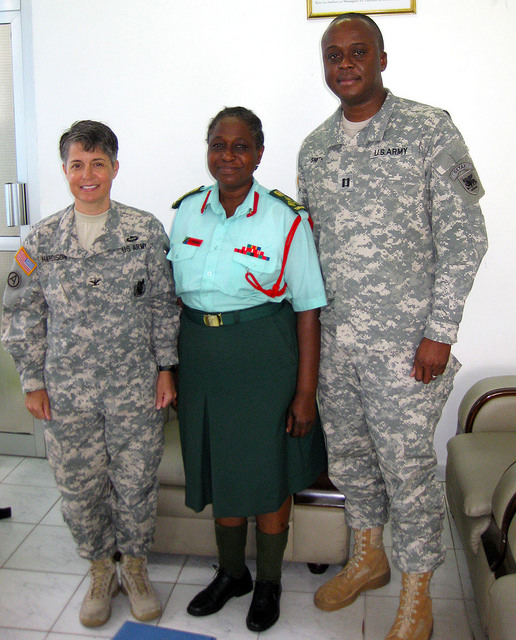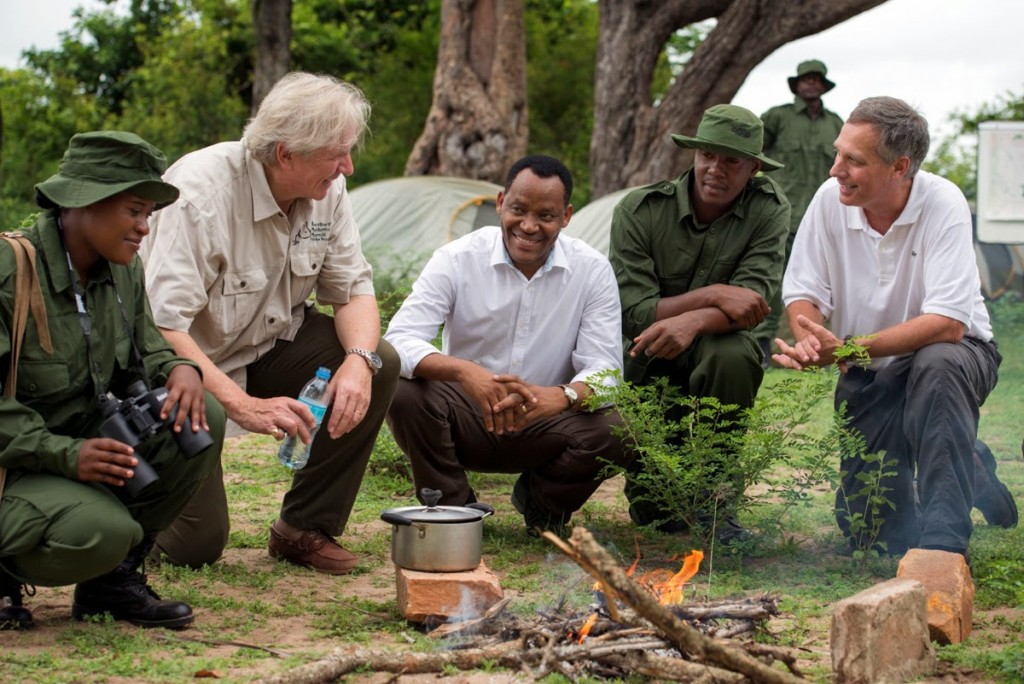Initial planning begins for joint TPDF-US Army Tanzania gender integration seminar.

U.S. Army Africa’s Col. Frances Hardison (left) and Capt. Christian Smith (right) meet with Tanzanian Peoples Defense Force Brig. Gen. Sara Rwambali (center) to discuss an upcoming gender integration seminar. Rwambali is the director of TPFD Social Affairs. TPDF personnel will co-host the seminar that will bring together leading experts in the area of integrating women in the armed forces throughout Africa. (U.S. Army Africa photo.)
By Mickie McNamara, U.S. Army Africa, G-1 Personnel Directorate
VICENZA, Italy – Recently, U.S. Army Africa’s Col. Frances Hardison and Capt. Christian Smith traveled to Dar Es Salaam and Arusha, Tanzania to plan a gender integration seminar co-hosted by the Tanzanian Peoples Defense Forces.
The event is tentatively scheduled for May. During planning, Hardison and Smith discussed the proposed events and activities with the TPDF’s highest ranking female. Hardison is the director of USARAF’s G-1, Personnel.
“I met with Brig. Gen. Sara Rwambali, director of TPDF Social Affairs, and she is very excited to co-host the Gender Mainstreaming Seminar with USARAF in Tanzania in 2015,” said Hardison.
The concept brief to Rwambali and Virginia Blazer, deputy chief of mission, U.S. Embassy Tanzania, detailed the goals of the seminar. According to Smith, a previous gender integration event has laid the ground work for the May seminar.
“We are capitalizing on the success of last year’s event. The idea remains to bring together various African partner nations to a week-long seminar to discuss best practices, lesson learned and explore ways forward with guest speakers from the United Nations, African Union, Southern African Development Community, East African Community and ECOWAS,” Smith said.
According to Hardison, co-hosting this event with TPDF is appropriate and timely. “Tanzania has been identified for increased activities in the USARAF area of responsibility and is a key player in EAC, SADC and the continent,” said Hardison.
She said TPDF personnel are eager to be offered the opportunity to co-host the seminar bringing together leading experts in the area of integrating women in the armed forces throughout Africa.
“In the United States we have a great deal of experience with integration. With the opening of new military occupational specialties for women, we continue to move in the right direction. We have a lot to share with our African partners, but also a lot to learn in how they have built and sustained their armies,” Hardison said.
The gender integration initiative supports Executive Order 13595 signed by President Obama and U.N. Security Resolution 1325, which supports engaging partner countries’ national security leadership to incorporate a gender perspective and women, peace and security initiatives in their planning and activities while promoting, supporting and encouraging African partners to integrate women into their defense forces.
Meanwhile, the governments of the United States and Germany transferred on Wednesday January 21, 2015, a significant amount of field equipment for use by Tanzanian game wardens patrolling the world famous Selous Game Reserve.

A US Embassy statement made available to TZ Business News in Dar es Salaam said this gesture is meant to contribute toward efforts to combat the very serious threat of poaching in the Selous Game Reserve.
The equipment handed over inside the Game reserve included small and large tents, torches, maps, binoculars, cameras, uniforms, and boots. In addition, the German Government announced support toward improvements to infrastructure such as roads, airstrips and housing for game rangers within the game reserve, while the U.S. Government has supplied the expertise of U.S Marine instructors to train game wardens on patrolling techniques and vehicle maintenance.
The event, attended by U.S. Ambassador Mark Childress and German Ambassador Egon Kochanke, and hosted by the Tanzanian Minister of Natural Resources & Tourism, Lazaro Nyalandu, served to not only mark the equipment handover, but more importantly to emphasize the importance of coordination of anti-poaching efforts among international partners, between the public and private sectors, and within the Government of Tanzania.
The U.S. equipment and services are part of a larger Tanzania-wide anti-poaching and wildlife conservation program worth $40 million over the next four years, while the German anti-poaching and wildlife conservation program in Tanzania is worth $51 million (2012 to 2016), including $21 million for the Selous. Representing NGO conservation efforts was Gerald Bigurube, Tanzania Programme Manager from the Frankfurt Zoological Society.
Making a statement during the equipment handover ceremony, Minister Nyalandu said, “This is a very special day for the Selous Game Reserve and the effort of the Government of Tanzania in marching toward victory in the battle against poaching.”
Ambassador Childress reinforced Minister Nyalandu’s comments by saying “This is a big day, but no one day can turn the tide in the battle against poaching. We need a lot of days like this.”
In addition, Ambassador Childress praised the Paul Allen Foundation for funding a new VHF system that will allow game scouts to communicate across secure channels and coordinate their anti-poaching efforts. He also commended the Hans Jorg Wyss Foundation for its ongoing support of the Frankfurt Zoological Society’s efforts in the Selous.
German Ambassador Kochanke said “The current poaching crisis threatens not only the survival of elephants and other wildlife in the area, but also the great potential of the Selous Game Reserve for economic development in the country as a whole, and for the districts adjacent to the Reserve in particular.”
Mr. Bigurube from the Frankfurt Zoological Society said “Foreign tourists travel at great expense to Tanzania and spend thousands of dollars to view this wildlife. This is our national commodity, and I call on every Tanzanian to protect it, because every Tanzanian has a role to play.”
Poaching is an increasingly serious threat in the Selous Game Reserve, in particular the poaching of elephants for ivory. Controlling this problem is difficult due to a number of factors including the sheer size of the Selous and lack of clear boundaries, as well as limited manpower and equipment to monitor and manage activities in the reserve. An aerial wildlife census in 2013 funded by Germany determined elephant numbers had declined from over 39,000 in 2009 to just over 13,000 in 2013. Between 2010 and 2013, 17,797 kilograms of illegally exported Tanzanian ivory (4692 elephant tusks) was seized at overseas ports. Solutions to the poaching of Tanzania’s wild elephant population are challenging and complex, but the U.S. and German governments are committed to cooperating with the Government of Tanzania, the private sector, and other domestic and international partners to preserve this natural and globally important treasure.
In December 2014, the Honorable Lazaro Nyalandu, Tanzania Minister of Natural Resources and Tourism, and Mark B. Childress, United States Ambassador to Tanzania, visited Ruaha National Park to mark the launch of the Southern Highlands and Ruaha-Katavi Protection Program (SHARPP).
This new $8.2 million five-year program is funded by the U.S. Agency for International Development (USAID) and will be implemented by the Wildlife Conservation Society (WCS) in partnership with the Government of Tanzania, local NGOs, and local communities. SHARPP will focus on four key areas: wildlife management areas (WMAs); livelihoods; habitat management; and elephant monitoring and protection. The program reaffirms the commitment from all parties to succeed in the fight against poaching.
Ambassador Childress, Minister Nyalandu, and other officials held discussions with law enforcement rangers, Ruaha National Park and SHARPP staff, and WMA leadership to gain a better understanding of the project at hand and challenges faced by conservationists. Ambassador Childress and Minister Nyalandu also received a demonstration of a new spatial monitoring tool being applied in the area.
Ambassador Childress endorsed project goals and the words of his counterpart by stressing that in order to succeed, anti-poaching and wildlife conservation efforts in Tanzania require a whole-of-government approach that delivers clear benefits to local communities.
The Greater Ruaha landscape currently holds the largest population of elephants in East Africa (28,000 including Katavi), and the Ruaha River is the most economically important watercourse in Tanzania. In addition to wildlife trafficking in these areas, unsustainable land and water practices place increasing pressure on natural resources.
An Embassy statement said through SHARPP, the U.S. Government hopes to address ecological and economic issues in the greater Ruaha and Southern Highlands. SHARPP forms part of a much larger U.S. Government commitment to wildlife conservation in Tanzania totaling $40 million over the next five years through USAID.



